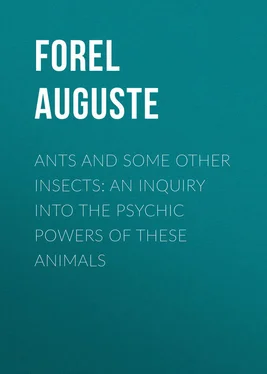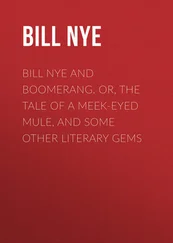Auguste Forel - Ants and Some Other Insects - An Inquiry Into the Psychic Powers of These Animals
Здесь есть возможность читать онлайн «Auguste Forel - Ants and Some Other Insects - An Inquiry Into the Psychic Powers of These Animals» — ознакомительный отрывок электронной книги совершенно бесплатно, а после прочтения отрывка купить полную версию. В некоторых случаях можно слушать аудио, скачать через торрент в формате fb2 и присутствует краткое содержание. Жанр: foreign_antique, foreign_prose, на английском языке. Описание произведения, (предисловие) а так же отзывы посетителей доступны на портале библиотеки ЛибКат.
- Название:Ants and Some Other Insects: An Inquiry Into the Psychic Powers of These Animals
- Автор:
- Жанр:
- Год:неизвестен
- ISBN:нет данных
- Рейтинг книги:3 / 5. Голосов: 1
-
Избранное:Добавить в избранное
- Отзывы:
-
Ваша оценка:
- 60
- 1
- 2
- 3
- 4
- 5
Ants and Some Other Insects: An Inquiry Into the Psychic Powers of These Animals: краткое содержание, описание и аннотация
Предлагаем к чтению аннотацию, описание, краткое содержание или предисловие (зависит от того, что написал сам автор книги «Ants and Some Other Insects: An Inquiry Into the Psychic Powers of These Animals»). Если вы не нашли необходимую информацию о книге — напишите в комментариях, мы постараемся отыскать её.
Ants and Some Other Insects: An Inquiry Into the Psychic Powers of These Animals — читать онлайн ознакомительный отрывок
Ниже представлен текст книги, разбитый по страницам. Система сохранения места последней прочитанной страницы, позволяет с удобством читать онлайн бесплатно книгу «Ants and Some Other Insects: An Inquiry Into the Psychic Powers of These Animals», без необходимости каждый раз заново искать на чём Вы остановились. Поставьте закладку, и сможете в любой момент перейти на страницу, на которой закончили чтение.
Интервал:
Закладка:
Bethe, Uexkull, and others would require us to hold fast to the physiological method, because it alone is exact and restricts itself to what can be weighed and measured. This, too, is an error which has been refuted from time immemorial. Only pure mathematics is exact, because in its operations it makes use solely of equations of abstract numbers. The concrete natural sciences can never be exact and are as unable to subsist without the inductive method of inference from analogy as a tree without its roots. Bethe and Uexkull do not seem to know that knowledge is merely relative. They demand absolute exactitude and cannot understand that such a thing is impossible. Besides, physiology has no reason to pride itself upon the peculiar exactitude of its methods and results.
Although we know that our whole psychology appears as the activity of our cerebrum in connection with the activities of more subordinate nerve-centers, the senses and the muscles, nevertheless for didactic purposes it may be divided into the psychology of cognition, of feeling and volition. Relatively speaking, this subdivision has an anatomico-physiological basis. Cognition depends, in the first instance, on the elaboration of sense-impressions by the brain; the will represents the psycho- or cerebrofugal resultants of cognition and the feelings together with their final transmission to the muscles. The feelings represent general conditions of excitation of a central nature united with elements of cognition and with cerebrofugal impulses, which are relatively differentiated and refined by the former, but have profound hereditary and phylogenetic origins and are relatively independent. There is a continual interaction of these three groups of brain-activities upon one another. Sense-impressions arouse the attention; this necessitates movements; the latter produce new sense-impressions and call for an active selection among themselves. Both occasion feelings of pleasure and pain and these again call forth movements of defense, flight, or desire, and bring about fresh sense-impressions, etc. Anatomically, at least, the sensory pathways to the brain and their cortical centers are sharply separated from the centers belonging to the volitional pathways to the muscles. Further on in the cerebrum, however, all three regions merge together in many neurons of the cortex.
Within ourselves, moreover, we are able to observe in the three above-mentioned regions all varieties and degrees of so-called psychic dignity, from the simplest reflex to the highest mental manifestations. The feelings and impulses connected with self-preservation (hunger, thirst, fear) and with reproduction (sexual love and its concomitants) represent within us the region of long-inherited, profoundly phyletic, fixed, instinct-life. These instincts are nevertheless partially modified and partly kept within due bounds through the interference of the higher cerebral activities. The enormous mass of brain-substance, which in man stands in no direct relation to the senses and musculature, admits not only of an enormous storing up of impressions and of an infinite variety of motor innervations, but above all, of prodigious combinations of these energies among themselves through their reciprocal activities and the awakening of old, so-called memory images through the agency of new impressions. In contradistinction to the compulsory, regular activities of the profoundly phyletic automatisms, I have used the term “plastic” to designate those combinations and individual adaptations which depend on actual interaction in the activities of the cerebrum. Its loftiest and finest expression is the plastic imagination, both in the province of cognition and in the province of feeling, or in both combined. In the province of the will the finest plastic adaptability, wedded to perseverance and firmness, and especially when united with the imagination, yields that loftiest mental condition which gradually brings to a conclusion during the course of many years decisions that have been long and carefully planned and deeply contemplated. Hence the plastic gift of combination peculiar to genius ranks much higher than any simpler plastic adaptability.
The distinction between automatism and plasticity in brain-activity is, however, only a relative one and one of degree. In the most different instincts which we are able to influence through our cerebrum, i. e., more or less voluntarily, like deglutition, respiration, eating, drinking, the sexual impulse, maternal affection, jealousy, we observe gradations between compulsory heredity and plastic adaptability, yes, even great individual fluctuations according to the intensity of the corresponding hereditary predispositions.
Now it is indisputable that the individual Pithecanthropus or allied being, whose cerebrum was large enough gradually to construct from onomatopœas, interjections and the like, the elements of articulate speech, must thereby have acquired a potent means of exploiting his brain. Man first fully acquired this power through written language. Both developed the abstract concept symbolised by words, as a higher stage in generalisation. All these things give man a colossal advantage, since he is thereby enabled to stand on the shoulders of the written encyclopædia of his predecessors. This is lacking in all animals living at the present time. Hence, if we would compare the human mind with the animal mind, we must turn, not to the poet or the savant, but to the Wedda or at any rate to the illiterate. These people, like children and animals, are very simple and extremely concrete in their thinking. The fact that it is impossible to teach a chimpanzee brain the symbols of language proves only that it is not sufficiently developed for this purpose. But the rudiments are present nevertheless. Of course the “language” of parrots is no language, since it symbolises nothing. On the other hand, some animals possess phyletic, i. e., hereditarily and instinctively fixed cries and gestures, which are as instinctively understood. Such instinctive animal languages are also very widely distributed and highly developed among insects, and have been fixed by heredity for each species. Finally it is possible to develop by training in higher animals a certain mimetic and acoustic conventional language-symbolism, by utilising for this purpose the peculiar dispositions of such species. Thus it is possible to teach a dog to react in a particular manner to certain sounds or signs, but it is impossible to teach a fish or an ant these things. The dog comprehends the sign, not, of course, with the reflections of human understanding, but with the capacity of a dog’s brain. And it is, to be sure, even more impossible to teach its young an accomplishment so lofty for its own brain as one which had to be acquired by training, than for the Wedda or even the negro to transmit his acquired culture by his own impulse. Even the impulse to do this is entirely lacking. Nevertheless, every brain that is trained by man is capable of learning and profiting much from the experience of its own individual life. And one discovers on closer examination that even lower animals may become accustomed to some extent to one thing or another, and hence trained, although this does not amount to an understanding of conventional symbols.
In general we may say, therefore, that the central nervous system operates in two ways: automatically and plastically .
The so-called reflexes and their temporary, purposefully adaptive, but hereditarily stereotyped combinations, which respond always more or less in the same manner to the same stimuli, constitute the paradigm of automatic activities. These have the deceptive appearance of a “machine” owing to the regularity of their operations. But a machine which maintains, constructs, and reproduces itself is not a machine. In order to build such a machine we should have to possess the key of life, i. e., the understanding of the supposed, but by no means demonstrated, mechanics of living protoplasm. Everything points to the conclusion that the instinctive automatisms have been gradually acquired and hereditarily fixed by natural selection and other factors of inheritance. But there are also secondary automatisms or habits which arise through the frequent repetition of plastic activities and are therefore especially characteristic of man’s enormous brain-development.
Читать дальшеИнтервал:
Закладка:
Похожие книги на «Ants and Some Other Insects: An Inquiry Into the Psychic Powers of These Animals»
Представляем Вашему вниманию похожие книги на «Ants and Some Other Insects: An Inquiry Into the Psychic Powers of These Animals» списком для выбора. Мы отобрали схожую по названию и смыслу литературу в надежде предоставить читателям больше вариантов отыскать новые, интересные, ещё непрочитанные произведения.
Обсуждение, отзывы о книге «Ants and Some Other Insects: An Inquiry Into the Psychic Powers of These Animals» и просто собственные мнения читателей. Оставьте ваши комментарии, напишите, что Вы думаете о произведении, его смысле или главных героях. Укажите что конкретно понравилось, а что нет, и почему Вы так считаете.












